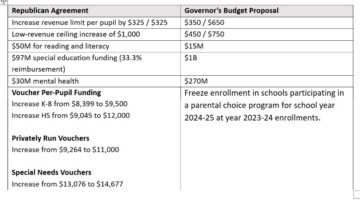Ed Advocacy Update: JFC to Take Up Public School Funding


Governor, Republicans Reach Agreement on School Funding. Governor Tony Evers last week announced an agreement with Republican legislators on some key areas of school funding in the state budget. The plan includes about $1 billion in new funds available to public schools, including for special education and mental health.
Budget Next Steps. The Joint Finance Committee will meet Tuesday to take up the K-12 budget, paving the way for completion of the state budget, after the deal this week on shared revenue and school funding components. With the movement, it’s possible the Legislature could wrap up by the budget by the end of June and send to the governor before July 4.
Dept. of Justice Office of School Safety. Republicans stripped provisions from Evers’ budget that would have used state dollars to backfill soon-to-expire federal funding for the state Justice Department’s Office of School Safety. The office is currently funded in part with about $1.8 million in federal COVID-19 relief dollars. That funding stream will expire in December.
Bills We’re Watching:
Reading Curriculum. (SB329) Requires phonics and “science of reading” curriculum, along with keeping third graders from advancing to the next grade based on standardized test results. The proposal lays out a series of requirements including the creation of a new office within the DPI and a commission on reading curriculum with appointed members from the Assembly and Senate majority leaders and the DPI. May be up for a public hearing in the Senate Ed Committee early next week.
Increasing Voucher Per-Pupil Payments. (AB305/SB330) Increases voucher payments: K-8 to $9,500; HS to $12,000; privately run charters to $11,000; special needs vouchers $14,677. The bill does not expand the voucher program, but does provide historic funding for vouchers. The Senate Ed Committee will hold a hearing on Monday and will vote Tuesday. The Assembly Ed Committee will hold a hearing Tuesday.
Financial Literacy. (AB109/SB115) Requiring one-half credit of personal financial literacy for high school graduation. Has received public hearing in Senate Ed Committee, has been referred to Assembly Ed Committee.


